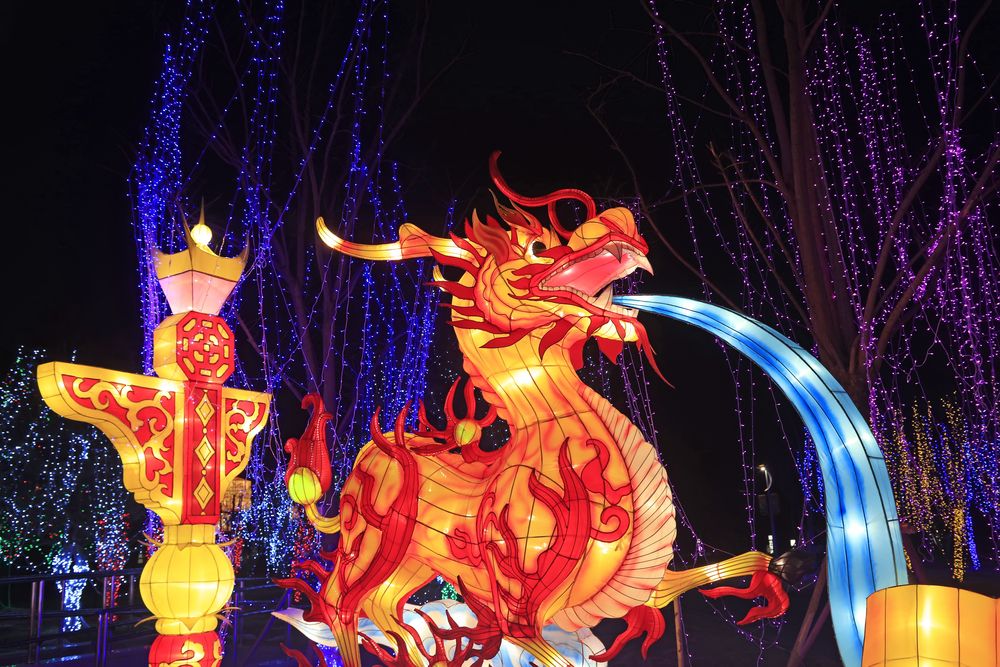
The Lantern Festival is a Chinese holiday marking the conclusion of the Chinese New Year celebrations (also known as the Spring Festival). It’s a time to honor deceased ancestors and is also known as a time of peace and reconciliation.
True to its name, the event includes plenty of lanterns – often in the form of large, bright-colored displays. While some lanterns are relatively simple, many others are incredibly elaborate, taking the form of horses, ships, dragons, and many other intricate shapes.
For Chinese people celebrating the Lantern festival, popular events include walking around to enjoy the different displays, eating tangyuan (a type of dessert made from sweet rice balls), watching traditional dances, and setting off fireworks.
When is the Lantern Festival Held?
The event, like many holidays in China, is tied to the lunar calendar. The Lantern Festival takes place each year on the 15th day of the first month of the lunar calendar, which will occur in early February of 2023.
How Did the Lantern Festival Start?
Here’s where things get interesting, because the reasons behind the festival remain a point of contention.
What everyone can agree on is that the first Lantern Festival celebrations were held about 2,000 years ago, during the Han Dynasty.
But there are competing theories about its true origins. Allow us to explain.
Theory 1: Early Buddhist Celebration
The first theory holds that the Lantern Festival dates back to the time of Emperor Ming of Han, who ruled from (58-75 CE). During this period, Buddhism was spreading across China and becoming popular among the people.
Buddist monks had a tradition of lighting lanterns on the 15th day of the first lunar month. When Emperor Ming, who supported the budding religion, learned of this custom, he ordered all the palaces and villages to follow suit.
The tradition simply continues to this day, this version explains.
Theory 2: Tricking the Jade Emperor
The second (and admittedly more interesting) theory revolves around a story of crime, punishment, and deception.
According to legend, the Jade Emperor (a famous mythical figure in China) had a favorite crane that was killed by nearby villagers. In retaliation, he decided to burn down their village.
But the Emperor’s daughter got wind of the plan, and sent a warning to the villagers ahead of time. To save themselves, they hatched a plan.
When the time came for their punishment, the people lit red lanterns, set off fireworks, and lit fires all around the village to make it seem like it was already aflame. Their plan of deception worked, as the Emperor left them alone because he thought the village had already burned.
To commemorate the event, each year the villagers would light lanterns in celebration… or so this theory goes.
Where Is the Lantern Festival Celebrated?
The largest Latern Festival celebrations of course take place in China, where hundreds of millions of people observe the holiday each year.
But the tradition has extended around the world, following the path of Chinese immigration. Lantern Festival events can now be found in many countires – including many cities in the United States.
2 comments
-
It's a German, and has nothing to do with a Chinese dragoon.
The story goes St. Martin, a soldier, gave a beggar the half of his soldier's coat to protect the man from freezing to death. Afterwards St. Martin became a bishop in order to help poor people. The lantern festival is to remember the event.
But truth is very Germans know about the story and the religious connection. Like so many Americans they view it as Christian nonsense and have dropped the religious connection and everyone has a good time. The kids love it and aren't brainwashed with religious nonsense.


Most every Pre-Christian culture on the Eurasian landmass had fire festivals at the turning of the seasons.